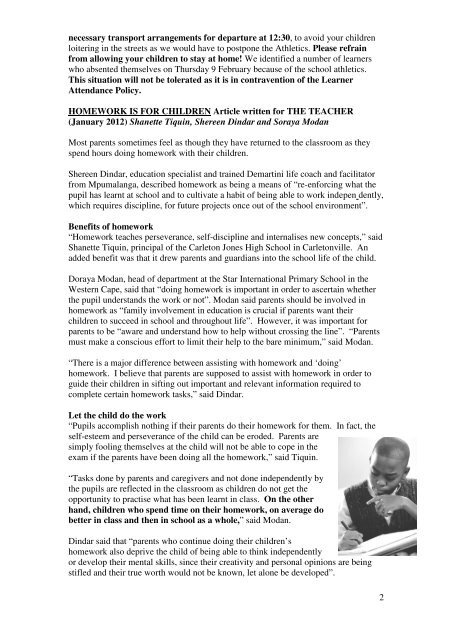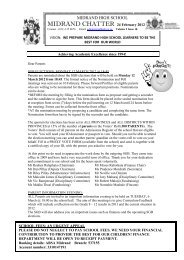MIDRAND CHATTER 3 February 2012 - Midrand High School
MIDRAND CHATTER 3 February 2012 - Midrand High School
MIDRAND CHATTER 3 February 2012 - Midrand High School
You also want an ePaper? Increase the reach of your titles
YUMPU automatically turns print PDFs into web optimized ePapers that Google loves.
necessary transport arrangements for departure at 12:30, to avoid your children<br />
loitering in the streets as we would have to postpone the Athletics. Please refrain<br />
from allowing your children to stay at home! We identified a number of learners<br />
who absented themselves on Thursday 9 <strong>February</strong> because of the school athletics.<br />
This situation will not be tolerated as it is in contravention of the Learner<br />
Attendance Policy.<br />
HOMEWORK IS FOR CHILDREN Article written for THE TEACHER<br />
(January <strong>2012</strong>) Shanette Tiquin, Shereen Dindar and Soraya Modan<br />
Most parents sometimes feel as though they have returned to the classroom as they<br />
spend hours doing homework with their children.<br />
Shereen Dindar, education specialist and trained Demartini life coach and facilitator<br />
from Mpumalanga, described homework as being a means of “re-enforcing what the<br />
pupil has learnt at school and to cultivate a habit of being able to work indepen dently,<br />
which requires discipline, for future projects once out of the school environment”.<br />
Benefits of homework<br />
“Homework teaches perseverance, self-discipline and internalises new concepts,” said<br />
Shanette Tiquin, principal of the Carleton Jones <strong>High</strong> <strong>School</strong> in Carletonville. An<br />
added benefit was that it drew parents and guardians into the school life of the child.<br />
Doraya Modan, head of department at the Star International Primary <strong>School</strong> in the<br />
Western Cape, said that “doing homework is important in order to ascertain whether<br />
the pupil understands the work or not”. Modan said parents should be involved in<br />
homework as “family involvement in education is crucial if parents want their<br />
children to succeed in school and throughout life”. However, it was important for<br />
parents to be “aware and understand how to help without crossing the line”. “Parents<br />
must make a conscious effort to limit their help to the bare minimum,” said Modan.<br />
“There is a major difference between assisting with homework and ‘doing’<br />
homework. I believe that parents are supposed to assist with homework in order to<br />
guide their children in sifting out important and relevant information required to<br />
complete certain homework tasks,” said Dindar.<br />
Let the child do the work<br />
“Pupils accomplish nothing if their parents do their homework for them. In fact, the<br />
self-esteem and perseverance of the child can be eroded. Parents are<br />
simply fooling themselves at the child will not be able to cope in the<br />
exam if the parents have been doing all the homework,” said Tiquin.<br />
“Tasks done by parents and caregivers and not done independently by<br />
the pupils are reflected in the classroom as children do not get the<br />
opportunity to practise what has been learnt in class. On the other<br />
hand, children who spend time on their homework, on average do<br />
better in class and then in school as a whole,” said Modan.<br />
Dindar said that “parents who continue doing their children’s<br />
homework also deprive the child of being able to think independently<br />
or develop their mental skills, since their creativity and personal opinions are being<br />
stifled and their true worth would not be known, let alone be developed”.<br />
2



